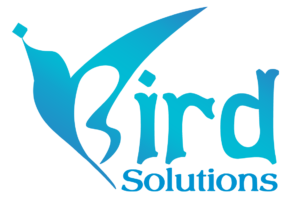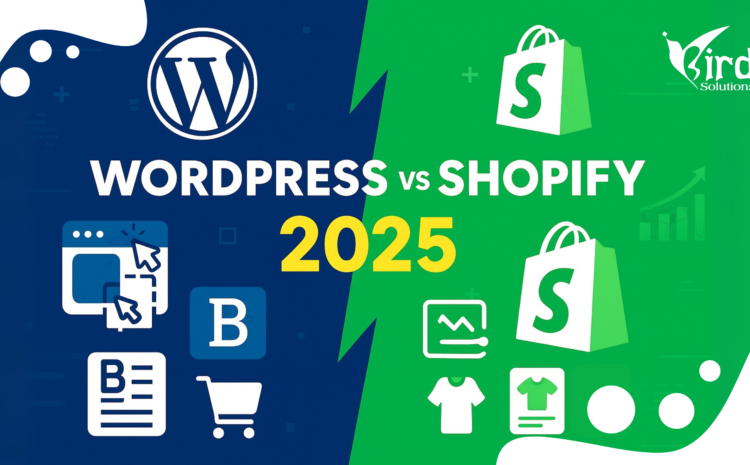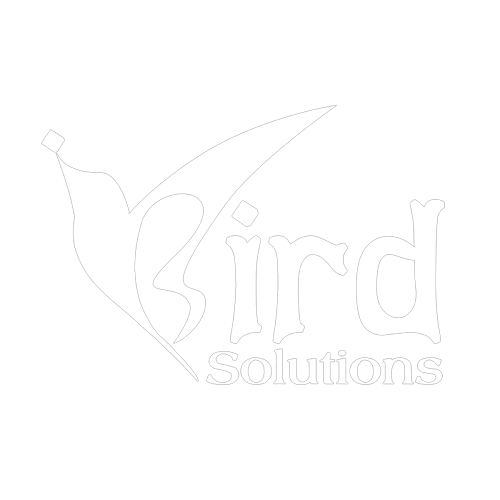WordPress vs Shopify: Which Is Better?
Choosing the right platform for your business website is one of the most crucial decisions you’ll make. In today’s competitive digital world, a well-built website is not just a digital brochure; it’s the foundation of your brand’s online presence, SEO strategy, digital marketing campaigns, and customer engagement.
At iBird Solutions, a leading web development and digital marketing agency in Ahmedabad, India. We often get asked: “Should I go with WordPress or Shopify for my business website?”
Both platforms dominate the website development market, but they serve different purposes. With combined expertise in developing websites on both WordPress and Shopify, we’ll break down the comparison for small businesses, e-commerce stores, and large enterprises.
What Makes WordPress Powerful in 2025?
WordPress powers over 40% of the world’s websites, making it the most popular CMS (Content Management System). It’s best known for its flexibility, scalability, and vast ecosystem of plugins and themes.
Key Features of WordPress
- Customization: With themes and plugins, businesses can design websites that perfectly match their brand. Tools like Elementor offer drag-and-drop functionality for non-coders.
- SEO-Friendly: WordPress is widely regarded as the best CMS for SEO. With plugins like Yoast SEO, businesses can optimize content, meta tags, and site performance easily.
- Content Management: Ideal for blogs, corporate websites, service-based businesses, and even large portals.
- Integrations: Seamlessly integrates with email marketing tools, CRM systems, and social media marketing platforms.
- Cost: WordPress itself is free, but you’ll need hosting, a domain, and premium plugins.
Why Shopify Remains the Go-To for eCommerce
Shopify is built specifically for e-commerce businesses. With its all-in-one platform, Shopify makes it easy to launch, manage, and grow an online store.
Key Features of Shopify
- Ease of Use: Perfect for beginners with no technical knowledge. Shopify handles hosting, security, and updates.
- eCommerce Power: Comes with built-in features like product listings, payment gateways, shipping integration, and inventory management.
- Apps & Plugins: Shopify’s App Store provides thousands of tools for marketing, payments, dropshipping, and more.
- Scalability: From small stores to enterprise-level eCommerce, Shopify adapts as you grow.
- Cost: Pricing starts at a monthly fee, including hosting and security. Extra costs may arise from premium apps.
Key Comparison – WordPress vs Shopify
| Feature | WordPress | Shopify |
|---|---|---|
| Ease of Use | Requires hosting setup, but with Elementor or Gutenberg, easy to manage. | Beginner-friendly, no hosting worries. All-in-one solution. |
| Design Flexibility | Unlimited customization with themes and plugins. | Limited themes, customization mainly through paid apps or coding. |
| SEO | Best-in-class SEO capabilities with plugins like Yoast SEO. | SEO-friendly, but less control compared to WordPress. |
| eCommerce | Needs WooCommerce plugin for store setup. Flexible but requires setup. | Built for eCommerce. Everything you need is included. |
| Cost | Free CMS + hosting + premium plugins = flexible costs. | Fixed monthly subscription, plus app costs. |
| Scalability | Excellent for blogs, corporate sites, and complex websites. | Best for eCommerce businesses scaling from small to enterprise. |
| Integration | Integrates with SEO tools, CRM, email marketing, and social media apps. | Great for eCommerce integrations, but limited for content-heavy sites. |
Which Platform Should You Choose in 2025?
Choosing between WordPress and Shopify in 2025 isn’t about which platform is “better” in general; it’s about which platform is better for your business goals. Here’s a framework to help you decide:
1. If Your Goal is Cost-Effective Flexibility → Go with WordPress
- Ideal for startups and small businesses that want maximum control at a lower cost.
- With Elementor and other drag-and-drop builders, you don’t need coding skills.
- Great for content-driven businesses (blogs, service-based companies, portfolio websites).
- SEO customization is stronger, making it perfect for companies relying on organic traffic.
Choose WordPress if you want scalable websites, SEO-first growth, and the freedom to customize.
2. If Your Goal is Quick Setup & Hassle-Free Store → Go with Shopify
- Best for retailers, e-commerce startups, and growing product brands.
- All-in-one solution with hosting, payment gateways, and security built in.
- No need to worry about technical maintenance that Shopify handles.
- Great for businesses that prioritize speed, simplicity, and sales automation.
Choose Shopify if you want fast go-to-market, 24/7 support, and global eCommerce readiness.
3. If Your Goal is SEO & Content Marketing → WordPress Wins
- WordPress integrates with advanced SEO tools like Yoast SEO and RankMath.
- Perfect for businesses investing in blogging, social media, and organic marketing.
- Highly flexible for landing pages, lead generation forms, and funnels.
4. If Your Goal is High-Volume eCommerce Scaling → Shopify Wins
- Handles thousands of products without slowing down.
- Shopify Plus supports large enterprises with global sales.
- Built-in integrations with email marketing, social media ads, and payment systems.
Cost and total cost of ownership (TCO)
- WordPress: Core WordPress is free, but real costs include hosting, premium themes, plugins (SEO, caching, security), and development time. You can begin inexpensively, but costs grow as complexity increases (custom features, high traffic hosting, enterprise integrations).
- Shopify: Predictable monthly subscription (starter plans to Shopify Plus). Shopify’s pricing is predictable, but add-ons (paid apps, transaction fees, third-party gateways) can increase monthly spend. Enterprise stores may find Shopify Plus pricing justified by platform stability and dedicated support. Shopify Plus pricing starts at a high tier for large enterprises.
For many businesses, a practical approach is to model both short-term launch costs and five-year TCO: WordPress can be lower initially, but maintenance and development increase TCO; Shopify is predictable, but app fees add up.
Maintenance, security, and performance
- WordPress requires active maintenance: plugin updates, theme updates, security hardening, and reliable hosting. With proper management (managed WordPress hosting, CDN, caching), performance and security match enterprise standards.
- Shopify handles hosting, patches, security, and PCI compliance out of the box; that is a huge advantage if you don’t want an in-house ops team.
If you want to focus entirely on growth and not infrastructure, Shopify removes much of the ops burden. If you require control over performance tuning and integrations, WordPress gives that capability, but it requires ongoing care.
Scaling and advanced commerce
- WordPress + WooCommerce can scale to large shops, but scaling requires architecture expertise: optimized hosting, database tuning, and robust caching. WooCommerce remains a very popular eCommerce choice and powers millions of stores globally.
- Shopify Plus is designed for high-volume merchants and enterprise needs with automation (Shopify Flow), advanced APIs, multi-store strategies, and dedicated support. It’s often the simplest route to global-scale commerce without building heavy custom infrastructure.
Integrations: Email Marketing, Social Media, and Paid Promotions
Both platforms integrate with modern marketing stacks:
- Email marketing (Mailchimp, Klaviyo), CRM integrations, analytics, and pixels work with both.
- Social media selling (Facebook, Instagram Shops, Pinterest) and paid promotions are supported across the board.
The real difference is where you manage complex automation: WordPress allows custom integrations for deep CRM flows; Shopify provides smooth out-of-the-box commerce tracking and easier ad-to-checkout flows.
Final Thoughts
Both WordPress and Shopify are powerful platforms, but the best choice depends on your business type. For content-heavy, SEO-driven websites, WordPress is unbeatable. For pure eCommerce businesses, Shopify provides a simple and powerful solution.
At iBird Solutions, we specialize in WordPress development, Shopify development, SEO services, social media marketing, email marketing, and digital marketing strategies that help businesses grow online.
Whether you’re a small business or a large enterprise across India, our team ensures your website isn’t just beautiful but also optimized for traffic, conversions, and long-term success.


